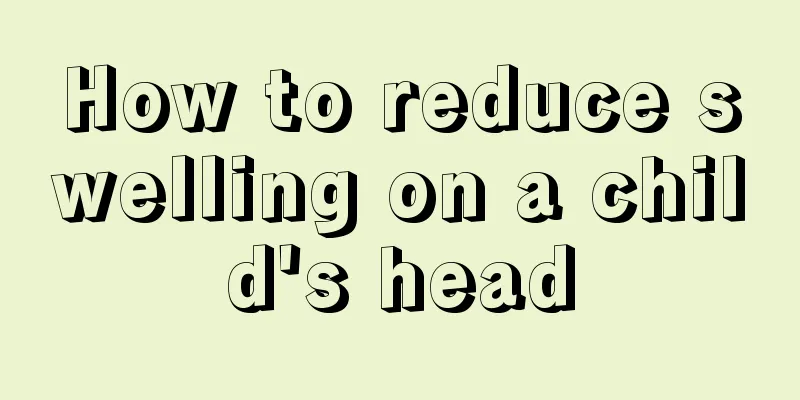What to do if a 4-year-old child has cavities?

|
We all know that children are prone to tooth decay when they are young, because they have no strong awareness of tooth protection. Many children often like to eat candy. Children like to eat candy, just like many men like to smoke. They can't quit smoking. If they like to eat candy, the chance of tooth decay is very high. Many children get tooth decay when they are 3-6 years old. The chance of a four-year-old child getting tooth decay is also very high. So what should a four-year-old child do after getting tooth decay? The 20 deciduous teeth of children will fall out gradually between the ages of 6 and 12 and be replaced by newly erupted permanent teeth. But deciduous teeth have their own functions and only need to be extracted in the following three situations: 1. If the deciduous teeth do not fall out during the tooth replacement period and affect the normal eruption of permanent teeth, they should be extracted regardless of whether they are loose or not. 2. Deciduous teeth that are repeatedly inflamed or have poor treatment responses may have an impact on the development of the permanent tooth germs beneath their roots and must be extracted. 3. Although the deciduous teeth that need to be extracted for orthodontic treatment have not reached the age of replacing teeth, they can be extracted according to the treatment plan in order to align the teeth in a sequential extraction method. How to take care of baby teeth 1. Switch to drinking milk from a cup as soon as possible: Young children tend to resist toothbrushes. Mothers can use gauze dipped in a little fluoride mouthwash to clean and wipe the baby's deciduous teeth, or use finger sleeves (available on the market, with granules on them) for cleaning. After one year old, starting from about 15 months, you can use a children's toothbrush to brush the baby's teeth. 2. Use gap filling agents to reduce the chance of tooth decay: Some teeth have uneven grooves, especially the biting surface, which are difficult for parents to clean with a toothbrush, so tooth decay can easily start from these gaps. It is recommended to ask a pediatric dentist to use a groove sealant (a transparent or colored resin) to fill the grooves to facilitate cleaning and reduce the chance of tooth decay. How to effectively prevent tooth decay in children 1. Improve your dietA balanced diet includes different types of food such as fruits, dairy products, grains, vegetables, meat, eggs, etc. that are rich in vitamins, calcium, phosphorus, and fluoride, and less high-sugar foods. A balanced diet is helpful for children's dental health. 2. Correct your child’s bad habits Young children have poor self-discipline, and some will unconsciously bite their fingers, suck their lips, lick their tongues, breathe with their mouths open, chew on one side, etc. These habits can cause dental deformities in children. Once discovered, parents should correct it in time. 3. Pay attention to oral hygiene from an early age This is the key to preventing "tooth decay". Develop the habit of brushing teeth in the morning and evening, and rinsing mouth after meals from an early age. Choose fluoride toothpaste and health children's toothbrush, and teach children the correct way to brush teeth - vertical brushing method. 4. Develop good feeding habits from an early age After feeding your child each time, clean up the food residue with gauze in time, massage the gums, and be careful not to add sugar to the milk before bedtime, just give plain water. If a child has cavities, we must take timely prevention measures. As parents, we must strictly control the child's bad eating habits. Children should not be given food that is too sweet, as this will have many effects on their bodies. Eating soup and candy frequently will not only cause cavities, but also make it easier to develop diabetes. Although it is not easy to detect when they are young, these sequelae will gradually occur as they grow up. Children with cavities must brush their teeth regularly. |
<<: How to deal with children's cavities
>>: Causes of abdominal pain and vomiting in a 4-year-old child
Recommend
What to do if a five-year-old boy is constipated?
Constipation is a common disease in life. For som...
Why is the child's urine white?
When children are young, their urination will be ...
Why does my baby have a fever and a lot of eye mucus?
Many babies have a lot of eye mucus when they hav...
Healthy weight loss methods and precautions for children
What are the healthy weight loss methods and prec...
What to do if your child keeps having a low-grade fever
In life, our beloved babies always have problems ...
What to do if there are red spots on the baby's back
It is every parent's wish to see their baby g...
What should I do if my baby hasn't had a bowel movement for two days?
The baby's physical health is what parents ca...
Will children with roseola become sleepy?
Roseola is a common problem in children, but we a...
What should I do if my baby has blood in his anus after defecation?
We all know that babies are more likely to get si...
What to do if a child has congenital hypospadias
There are two main ways to control the disease, o...
What causes a child to have a fever and diarrhea?
After having a child, every parent will put the c...
What should I do if my child has diarrhea and fever at night?
Fever and diarrhea are very common on weekdays, b...
An expanded introduction to rheumatoid arthritis in children
Not only adults can suffer from rheumatoid arthri...
What is the itchiness on the child's body?
Children's skin is usually very fragile. Some...
What to do if your child cries when entering kindergarten
Many children will cry non-stop when they first s...









